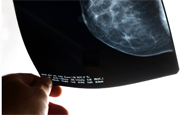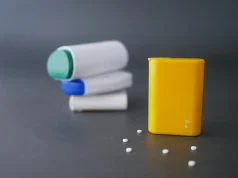Lipid and metabolite deregulation seen in breast tissue of women carrying BRCA1/2 mutations
WEDNESDAY, March 4, 2015 (HealthDay News) — Use of localized correlated spectroscopy (COSY) shows significant changes in women with BRCA1 and BRCA2 mutations, according to a study published online March 3 in Radiology.
Saadallah, Ramadan, Ph.D., from the University of Newcastle in Australia, and colleagues compared localized COSY images recorded at 3 Tesla in the breast tissue of women carrying BRCA1 (nine women) or BRCA2 (14 women) gene mutations and in 10 healthy controls with no family history of breast cancer. Participants also underwent contrast material-enhanced magnetic resonance imaging (MRI) and ultrasonography.
The researchers found that there were no abnormalities recorded with MRI or ultrasonography. In the BRCA1 cohort, metabolite levels were reduced by 79 percent compared with triglyceride level (P = 0.014), and a 19 percent increase was seen in lipid unsaturation and triglyceride levels versus cellular cholesterol level (P = 0.027 and 0.086, respectively). Compared with diallylic lipid level, cholesterol level was reduced by 47 percent (P = 0.027). In the BRCA2 cohort, metabolite levels showed increased unsaturation of 21 percent relative to triglyceride levels (P = 0.030). Significant increases were seen in cholesterol levels compared with diallylic lipid level and triglyceride levels in the BRCA2 cohort. Compared with cholesterol level, there were significant reductions in levels of diallylic lipid, unsaturated lipid, triglycerides, and terminal methyl on the acyl chain.
“If these changes are ultimately proven to be a premalignant stage, this method may prove useful in screening,” the authors write.
Two authors disclosed financial ties to Hunter Cancer Research Alliance; several authors disclosed holding a U.S. provisional patent application.
Copyright © 2015 HealthDay. All rights reserved.








